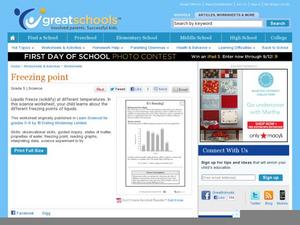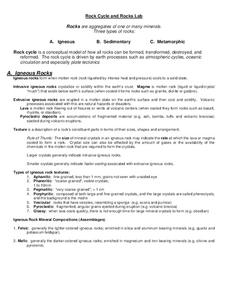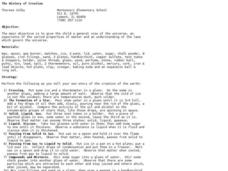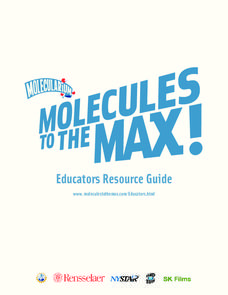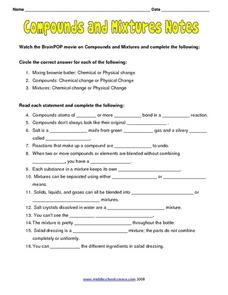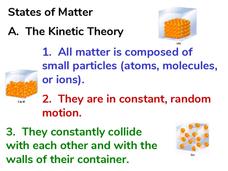Colorado State University
Can Boiling Make Something Freeze?
Use boiling as an avenue for freezing. Young scholars watch as liquid nitrogen removes heat from the ingredients for ice cream. As this happens, the nitrogen boils and the ice cream freezes—all in the same container. A little science magic!
K12 Reader
Water Cycle
solid, liquid, and gas. The three different forms of water are the subject of the article used to assess reading comprehension. After reading the article, kids respond to a series of comprehension questions based on the text.
Curated OER
It's Freezing!
Here is a good activity for 5th grade scientists. In it, they look at a bar graph that shows the freezing point for a variety of liquids. Then, they are given a scenario of a certain liquid melting and freezing, and must determine which...
Curated OER
Earth's Water
If the majority of our planet is covered with water, why do we need to bother conserving it? With a thorough and varied investigation into the location and types of water on the earth, learners will gain an understanding of why this...
Curated OER
Primary Biological Content Area
Students complete activities to learn about the growth process for crystals. In this crystal growth lesson, students use the given materials to complete a liquid bluing activity. Students observe and analyze the growth of crystals.
Curated OER
Cooking Fun
Students explore a variety of methods for the measurement of dry, semi-solid, and liquid ingredients. Real kitchen utensils and food items are utilized in this lesson.
Curated OER
Minerals
In this minerals worksheet, students are given 6 statements about minerals and they find the errors in each sentence and re-write each properly. They also fill in the blanks for 8 sentences with given terms related to minerals, groups of...
Curated OER
5th Foss M&s Word Search Puzzle
In this properties and characteristics of substance worksheet, students review and study six key terms associated with matter and then locate those six terms in a word search puzzle.
University of New Orleans
Rock Cycle and Rocks Lab
Science rocks! Explore three types of rocks and the rock cycle with an igneous rocks experiment. Pupils discuss textures, composition, and learn how melts are formed from the Earth's crust. They weigh materials using a scientific scale...
National Nanotechnology Infrastructure Network
Wet Etching in Nanofabrication
Chemistry and physics combine forces to benefit nanofabrications. Learners examine the process of wet etching in nanofabrication. Using corrosive substances such as lemon juice and Coca-Cola, they model the etching process. They then...
Royal Society of Chemistry
Organic Molecules Day—Chemistry Outreach
In search of an organic lab that employs real-life techniques and analysis methods? Groups carry out the nitration of methyl benzoate, then attempt to determine the number and location of the nitro groups added to the benzene ring....
American Chemical Society
Why Does Water Dissolve Salt?
Individuals explore solubility by modeling how water dissolves salts. They then view a video and compare how well water and alcohol dissolve salts, relating their comparisons to the structure of each molecule.
Curated OER
THE WONDERFUL WATER CYCLE
Learners are introduced to the processes of evaporation and condensation as they observe physical changes in water. They observe how matter changes from a solid to a liquid state. Students are explained that steam is water in its gaseous...
Curated OER
The History of Creation
Students explore the properties of matter. In this lesson about matter, students will do a series of experiments to enable them to understand about creation of the universe. In these some of the experiments students will makes stars,...
Curated OER
Warming by Freezing
Ninth graders discover the reasoning behind spraying water on fruit and seedlings in preparation for hard freezes. In this conceptual physics lesson, 9th graders conduct an experiment to measure the heat released when water goes from a...
Rensselaer Polytechnic Institute
Molecules to the Max!—Educators Resource Guide
From molecules to nanotubes, an engaging unit explores the world of tiny science. Fifteen hands-on experiments and lessons engage young scientists as they learn chemistry. Discussions, worksheets, and data analysis reinforce the concepts...
Curated OER
Compounds and Mixtures Notes
In this matter worksheet, students watch a movie and then compare the differences between compounds and mixtures. This worksheet has 16 fill in the blank questions.
Curated OER
Measuring Water Vapor: The Microwave Water Radiometer (MWR)
Students investigate water vapor. They view and analyze photos, conduct Internet research, and analyze the total water vapor/total liquid water data plot.
Curated OER
Igneous Rocks
Learners perform experiments in which they grow crystals. They draw pictures of where each type of rock originates from. They also identify igneous rocks by using a chart.
Curated OER
What's the Matter? Where Did it Go?
Eighth graders analyze questions posted on a large poster in the room and work in groups to record their response to the question on paper, rotating to the next question after two minutes have passed. They review the characteristics of...
Curated OER
Ice Cream
Students explore the concept of the colligative property. Through experimentation, students lower the freezing point of a liquid in order to create a solid by using household ingredients to create ice cream.
Curated OER
Molecules
Young scholars combine movement with science in this fun integrated instructional activity. When students are "liquid" they can "melt" or "ooze" at the end and when they are are "solids" they can "freeze" in a shape.
Curated OER
States of Matter
This particle PowerPoint includes many pictures to illustrate solids, liquids and gasses and the behavior of their particles.
Curated OER
Quick Freeze (Demonstration)
Students witness an demonstration in which a bottle of club soda will go from a liquid to a solid when it is opened and the carbon dioxide is allowed to escape. This will help them understand that the freezing point of a solution will...




